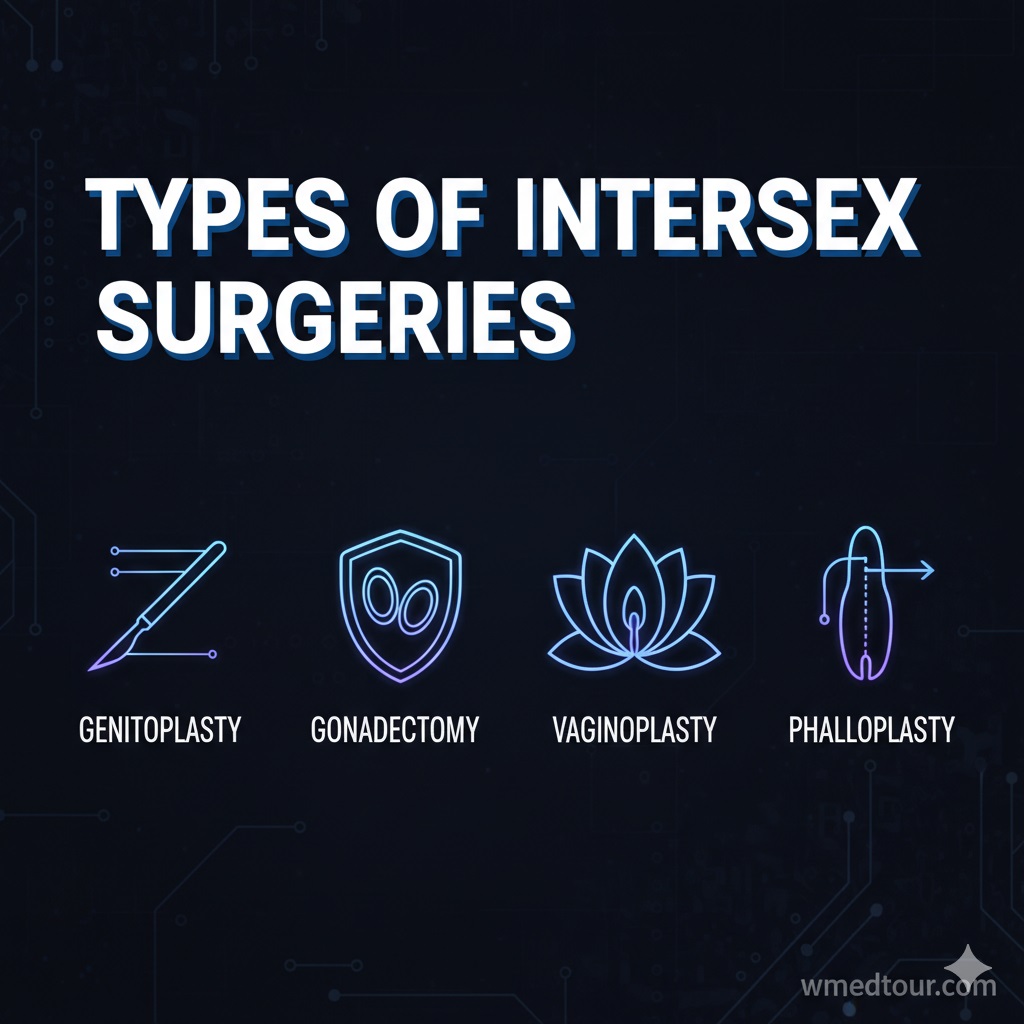Intersex Genital Surgeries and Ethics: Guide to Procedures and Consent
Executive Summary: Key Takeaways on Intersex Surgeries
Navigating the complexities of **Intersex Genital Surgeries and Ethics** is crucial for both patients and providers facing decisions on procedures like Genitoplasty, Gonadectomy, Vaginoplasty, and Phalloplasty. **Intersex Genital Surgeries and Ethics** represents a modern framework for care, recognizing that intersex variations are diverse, and the surgical options available carry complex medical and ethical considerations. Historically, surgeries were often performed in infancy, but modern consensus emphasizes a shift toward delayed, patient-driven decisions. Understanding the technical aspects, potential outcomes, and ethical landscape is crucial. We explore each surgical type, detailing its purpose, procedure, and critical discussions surrounding consent and long-term well-being. The main goal of modern care is to ensure medical decisions align with the patient’s developing identity and informed consent.
Learn more about the Pediatric vs. Adult Intersex Surgery Ethics Consensus.
Understanding Intersex Variations and the Role of Surgical Intervention
Intersex is a general term used for a variety of conditions where a person is born with a reproductive or sexual anatomy that doesn’t fit the typical definitions of female or male. These conditions, often referred to as Differences of Sex Development (DSD), are diverse, encompassing hormonal, chromosomal, and anatomical variations. Historically, medical interventions, including various **intersex genital surgeries**, were often performed early in life to “normalize” the external appearance. As awareness and patient advocacy have grown, the focus has shifted dramatically toward prioritizing informed consent and quality of life over cosmetic appearance.
The conversation around Genitoplasty, Gonadectomy, Vaginoplasty, and Phalloplasty has become deeply rooted in patient autonomy. Many professionals now advocate for delaying non-medically necessary surgeries until the individual can participate meaningfully in the decision-making process. Therefore, most of these procedures are now often undertaken in adolescence or adulthood, much like gender confirmation surgery, ensuring decisions are truly patient-centered. Understanding the current best practices in **Intersex Genital Surgeries and Ethics** is vital for all parties involved.
Genitoplasty: The Practice of Genital Reconstructive Surgery
**Genitoplasty** refers to a broad category of surgical procedures aimed at modifying the external genitalia. This is one of the most common intersex surgeries, historically performed on infants with ambiguous genitalia, such as those with Congenital Adrenal Hyperplasia (CAH). The procedure’s primary goal is to create a genital appearance that aligns with the assigned gender. However, its ethical status is under intense scrutiny worldwide, especially when discussing **Intersex Genital Surgeries and Ethics** in the context of minors.
Clitoral Reduction and Vaginoplasty: Genital Procedure Components
In individuals assigned female, genitoplasty may involve a clitoral reduction (or clitoroplasty) and procedures to increase the depth of the vagina (a form of Vaginoplasty). The aim is to create a typical-looking vulva while preserving sensitivity and sexual function. Nonetheless, this is a complex balance that is not always successfully achieved, particularly when performed early in life. A major concern is the potential for loss of sensation and psychological distress later in life.
Pros and Cons of Genitoplasty
| Pros | Cons |
|---|---|
| May reduce parental anxiety about external appearance. | Risk of reduced sexual sensation and function. |
| Can aid in creating a consistent urinary tract (hypospadias repair). | Requires subsequent surgeries or dilations later in life (especially for Vaginoplasty component). |
| May alleviate some social stigma and difficulties in childhood (though this is debated). | Potential for psychological distress and regret due to lack of personal consent. |
Source: National Institutes of Health (NIH) on DSD Treatment.
Gonadectomy: Surgical Removal of Gonads and Ethical Considerations
A **Gonadectomy** is the surgical removal of the gonads (testes or ovaries). As a critical type of intersex genital surgery, it is usually considered for individuals with certain DSDs, such as Swyer syndrome or Androgen Insensitivity Syndrome (AIS), due to an increased risk of developing gonadal tumors (gonadoblastoma or dysgerminoma). This procedure is medically significant, yet the timing remains highly contentious.
Why Timing is Crucial for Gonadal Removal
While preventative gonadectomy certainly reduces cancer risk, removing gonads before puberty eliminates the natural production of sex hormones. Therefore, lifelong hormone replacement therapy is necessary, which comes with its own set of challenges, although it can also be an intentional choice to manage hormone levels. Moreover, experts now often recommend delaying removal until late adolescence or adulthood, when the individual can fully understand the implications. This approach is particularly important in cases where the cancer risk is low before puberty, such as with complete AIS, allowing the person a choice about their hormonal development and fertility preservation, an issue also relevant in certain oncology contexts. The evolving guidelines for **Intersex Genital Surgeries and Ethics** place patient autonomy at the forefront of the gonadectomy decision.
Pros and Cons of Gonadectomy
| Pros | Cons |
|---|---|
| Eliminates the risk of gonadal malignancy (tumor development). | Results in immediate, permanent infertility. |
| Removes the need for ongoing surveillance for potential tumors. | Requires lifelong Hormone Replacement Therapy (HRT). |
| May prevent unwanted pubertal changes in some cases. | Loss of natural pubertal development and potential for long-term health issues linked to early HRT (e.g., bone density). |
Source: University of California, San Francisco (UCSF) on DSD care.
Internal Link: Find a specialist in Urological Surgery.
Vaginoplasty and Phalloplasty: Advanced Genital Construction
**Vaginoplasty** and **Phalloplasty** represent two more complex intersex genital surgeries, commonly performed in adults with DSDs to create or modify a vagina or a phallus, respectively. Significantly, these procedures are about aligning the body with the individual’s gender identity and achieving functional, aesthetic, and sexual goals.
Vaginoplasty Techniques for Intersex Care
In intersex care, Vaginoplasty is used to create or deepen a vagina. Techniques vary widely, from dilation methods to surgical creation using skin grafts (penile inversion) or intestinal segments. A key consideration, in all cases, is the potential need for regular post-operative dilation to maintain depth, a major commitment for the individual.
Phalloplasty and Metoidioplasty: A Comparative Look
**Phalloplasty** involves constructing a neophallus. Consequently, this highly specialized surgery often utilizes tissue from the forearm (radial forearm flap) or thigh (anterolateral thigh flap). Conversely, a simpler, less invasive option is **Metoidioplasty**, which enhances the existing clitoral structure. The result is often a smaller phallus but with preserved clitoral sensitivity. These procedures are critical for many intersex individuals assigned male at birth who do not have a typical penis, offering a pathway to greater congruence with their identity. The decision between these options is a key part of informed discussions within **Intersex Genital Surgeries and Ethics**.
Comparison of Intersex Genital Surgeries
| Procedure | Primary Goal | Complexity/Major Risk | Long-Term Maintenance |
|---|---|---|---|
| **Vaginoplasty** | Creation or deepening of the vagina. | Risk of stricture (narrowing), requiring revision surgery. | Regular dilation is usually required to maintain depth. |
| **Phalloplasty** | Construction of a neophallus with optional urethral lengthening. | High risk of urethral complications (fistula, stricture) if urethroplasty is performed. | Often requires penile implant for erectile function. |
Source: World Health Organization (WHO) information on DSD and human rights.
Determining Eligibility and Timing: The Core of Intersex Genital Surgeries and Ethics
The decision to undergo any of these intersex genital surgeries is profoundly personal and complex. The primary audience for this information includes intersex adults considering their options, parents of intersex children seeking ethical guidance, and medical professionals dedicated to best-practice care. Specifically, guidelines separate procedures into two categories:
- Medically Necessary Surgeries: Procedures to address immediate life-threatening concerns (e.g., internal organ issues). These exceptions supersede the “delay” principle.
- Elective/Optional Surgeries: Procedures like aesthetic Genitoplasty, Vaginoplasty, or Phalloplasty should be delayed until the patient is mature enough to provide informed consent. This is a standard highly supported by international human rights and medical bodies. This policy contrasts starkly with past practices.
Intersex care is not about a checklist; it’s about a life-long journey of self-determination. The shift toward “watchful waiting” is meant to give the child autonomy over their body as an adult, recognizing that the long-term psychological outcome is paramount. Similarly, this concept mirrors careful vetting for complex procedures like oncological surgery, where patient-specific risks are prioritized.
Source: Harvard University research on bioethics and DSD.
Internal Link: Explore Gynecological Surgery options.
Hypothetical Case Study: Alex’s Journey with Intersex Surgeries
Alex was born with a complex DSD and assigned female. Early medical advice suggested immediate Genitoplasty and later, a prophylactic Gonadectomy to prevent potential tumor development. However, Alex’s parents chose a modern approach: delaying all non-essential surgeries until Alex could consent. Throughout childhood, Alex received comprehensive counseling and non-surgical support. At age 18, after extensive deliberation with a multidisciplinary team, Alex identified as non-binary and elected for a less invasive procedure. Alex decided against Vaginoplasty but chose a partial Gonadectomy on one side, keeping the other gonad for natural hormone production while still mitigating risk. Ultimately, this patient-driven decision minimized surgical risk while maximizing autonomy and mental well-being, illustrating a successful, modern ethical outcome in the journey through **Intersex Genital Surgeries and Ethics**.
Internal Link: Pre-travel resources and checklists for medical patients.
The Ethical and Psychological Imperative in Modern Intersex Care
The ethical debate remains central to all intersex genital surgeries, particularly those performed on infants and children. Major global medical associations increasingly caution against early, irreversible surgeries for non-urgent conditions. Instead, they stress that medical intervention should primarily be to ensure physical health. Consequently, the psychological fallout from non-consensual surgery can be severe, leading to body image issues, sexual dysfunction, and profound distrust of the medical system. Effective care, therefore, involves a multidisciplinary team: geneticists, endocrinologists, surgeons, and, most importantly, mental health professionals and peer support groups. This holistic approach ensures that medical decisions respect the individual’s bodily integrity and future capacity for self-determination. The successful navigation of this complex field requires a delicate balance of medical necessity and patient choice. Source: Cambridge University Press on DSD and ethical care.
Internal Link: Considering Plastic Surgery procedures.
Internal Link: Find a qualified specialist for complex surgeries.
FAQ Section: Addressing Your Concerns About Intersex Surgeries
Medical Procedures and Controversies (FAQs 1-6)
Consent, Alternatives, and Long-Term Intersex Care (FAQs 7-12)
Conclusion: Prioritizing Autonomy in Intersex Care
The landscape of intersex genital surgeries is rapidly evolving. The standard of care is shifting from early, preemptive intervention to deferred, patient-led decision-making. By focusing on the individual’s long-term physical health, psychological well-being, and capacity for informed consent, medical professionals can ensure that intersex individuals receive compassionate and ethical care that respects their bodily autonomy. Resources like this guide provide the necessary technical foundation, consequently fostering a more informed and empathetic discussion among patients and providers alike regarding **Intersex Genital Surgeries and Ethics**.
If you or a loved one are considering these options, furthermore, seeking consultation from a specialized multidisciplinary center is the most responsible first step. Your journey is unique, and your decisions should be entirely your own. Read more frequently asked questions here.




